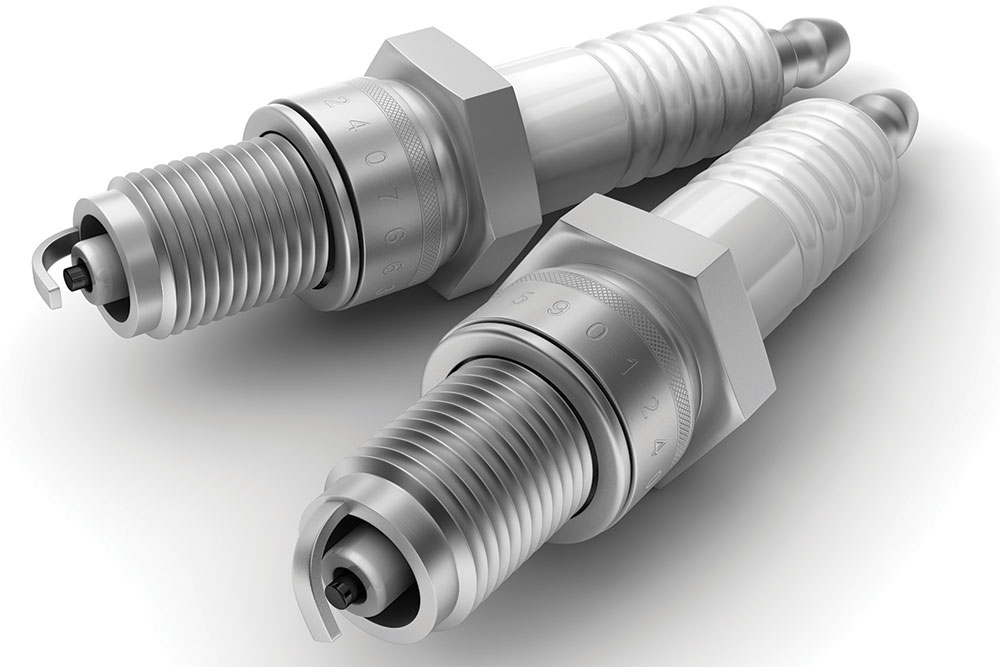Choosing the correct sparkplugs is vital
Changes to fuels and improved sparkplug electrode materials have had a major influence on sparkplug service life in modern engines.

The service schedule for many vehicles these days won’t include a fresh set of plugs until 100,000km or more.
What hasn’t changed is that it’s still vital that replacement sparkplugs meeting the vehicle manufacturer’s original specifications are installed to avoid severe engine damage, ensure proper vehicle performance and maximum plug life.
Plugs have to ‘fit’ correctly, so that means correct ‘reach’ (the length of the threaded nose), correct seat design (the sealing taper or gasket), correct nose thread and diameter, plus the right electrode design, projection and material type.
Sparkplugs are designed to run at a temperature that ensures they don’t foul with combustion deposits, but cool enough to avoid ‘pre-ignition’, plug or engine damage.
Therefore, it’s vitally important the specified heat range plug is used in a standard (unmodified) engine.
Modified engines, including those converted to LPG, may require a different heat range plug and professional advice should be sought.
Sparkplugs incorporating precious metals, such as platinum and iridium, are frequently specified and can be substantially dearer.
Don’t substitute cheaper ‘standard’ plugs though, as they have different firing qualities.
The gap between the electrodes needs to be checked and set to the correct specification for the engine.
Precious metal plugs usually come with the gap pre-set to the correct gap for the specific engine, as the laser-welded electrode tips can be easily damaged.
Some vehicle makers specify a resistor plug with an internal resistor to prevent interference with sensitive electronics including on-board engine management systems.
Related topics
Things to note
The information in this article has been prepared for general information purposes only and is not intended as legal advice or specific advice to any particular person. Any advice contained in the document is general advice, not intended as legal advice or professional advice and does not take into account any person’s particular circumstances. Before acting on anything based on this advice you should consider its appropriateness to you, having regard to your objectives and needs.
Insurance Products (excluding Travel Insurance) are issued by RACQ Insurance Limited ABN 50 009 704 152 (RACQI) and arranged by RACQ Distribution Services Pty Ltd (RDS) ABN 35 116 361 650, AFSL 567130 and RDS' authorised representatives (including RACQ Operations Pty Ltd ABN 80 009 663 414, AR No. 234978 (RACQO)). Conditions, limits and exclusions apply.
Any advice provided by RDS and RACQO is general advice only and does not take into account your personal objectives, financial situation or needs and you will need to consider whether the advice is appropriate for you. Read the Product Disclosure Statement (PDS) before making a purchase decision on the product. You can also access our Target Market Determinations on this website.
RDS receives a commission from RACQI for the policies it arranges. RACQO receives fees paid for services it provides to RDS. Further details about remuneration are available on request prior to purchasing.
Banking and loan products issued by Members Banking Group Limited ABN 83 087 651 054 AFSL/Australian credit licence 241195 trading as RACQ Bank. Terms, conditions, fees, charges and lending policies apply. This is general advice only and may not be right for you. This information does not take your personal objectives, circumstances or needs into account. Read the disclosure documents for your selected product or service, including the Financial Services Guide and the Terms and Conditions, and consider if appropriate for you before deciding.
Except for RACQ Bank, any RACQ entity referred to on this page is not an authorised deposit-taking institution for the purposes of the Banking Act 1959 (Cth). That entity’s obligations do not represent deposits or other liabilities of RACQ Bank. RACQ Bank does not guarantee or otherwise provide assurance in respect of the obligations of that entity, unless noted otherwise.
RACQ Bank subscribes to the Customer Owned Banking Code of Practice which establishes higher standards than the law requires. The Code reflects modern consumer expectations and developments in approaches to issues such as consumer vulnerability, guarantors, and supporting customers through financial hardship. Please read our Customer Owned Banking Code of Practice page for more information.
RACQ Operations Pty Ltd (ABN 80 009 663 414 AR 000234978) and Members Travel Group Pty Ltd (ABN 45 144 538 803 AR 000432492) are acting as an Authorised Representative of the issuer of the insurance, Tokio Marine & Nichido Fire Insurance Co., Ltd. (ABN 80 000 438 291 AFSL 246 548). Any advice set out above is general in nature only, and does not take into account your objectives, financial situation or needs. Before purchasing any travel products, please consider the RACQ Travel Insurance Product Disclosure Statement (PDS) and the Target Market Determinations (TMDs) that apply to these products. Whilst the PDS outlines the Terms and Conditions of these products, the TMDs outline the intended class of customers that comprise the target market for these travel products. This will allow you to consider which products best suit your objectives, financial situation and needs and consider the products appropriateness to your personal circumstances. TMDs also outline matters involving the distribution and the review of these products. The PDS, Supplementary PDS and TMDs for each travel product can be found here.
